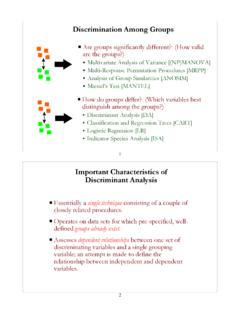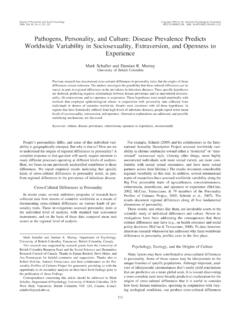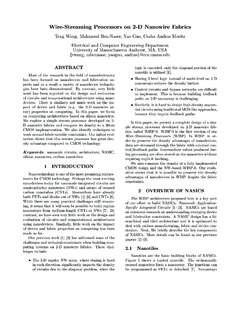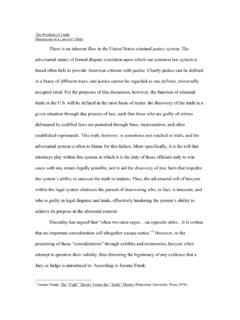Transcription of Why Schumpeter got it Wrong in Capitalism, Socialism, and ...
1 Why Schumpeter got it Wrong inCapitalism, socialism , and DemocracyHerbert GintisChallenge MagazineAugust 19901 IntroductionJoseph Schumpeter sCapitalism, socialism , and Democracyis above all an exer-cise in prediction. Born in the English Industrial Revolution and thrust into promi-nence by its successes in France, Germany, and the United States, capitalism hadexisted for more than a century when Schumpeter began to assemble the materialfor his book. socialism had a much shorter history. A constant theme in workers movements, socialism first became tangible through the establishment of the So-viet economic system scarcely twenty-five years before Schumpeter wrote. Despitethis disparity in age, and with no empirical indication of the newcomer s practicalviability, Schumpeter boldly proclaimed socialism the neworder, while judgingcapitalism as doomed to power of Schumpeter s argument was immediately apparent to his con-temporaries.
2 By both supporting capitalism and predictingits inevitable demise, Schumpeter established himself as a true iconoclast. He moreover abandoned thetwo central intellectual reference points around which thecapitalism- socialism de-bate had traditionally turned: on the one hand philosophical arguments concerningthe validity of historical materialism, and on the other hand economic argumentsconcerning the viability of the command economy. Having no need for generaltheories of history, Marxian or liberal, Schumpeter rejected the former pure andsimple; and being quite confident in the ability of the socialist economy to operateefficiently, he sided unequivocally with Enrico Barone and the socialists in theirfamous dispute with the arch-defenders of private property, Friedrich Hayek andLudwig von if, with Schumpeter , we define socialism as collective property and plan-ning by public authority ( Schumpeter 1942, p.)
3 415) then his major thesis has not1been historically vindicated. Indeed, not only does capitalism continue to flour-ish, but state socialism in this traditional sense is ever more harshly questionedeven in societies which have historically been its most passionate supporters. InSchumpeter s words, socialism is that organization of society in which the meansof production are controlled, and the decision on how and what to produce and onwho is to get what, are make by public authority instead of by privately-owned andprivately-managed firms. Where did Schumpeter go Wrong ? The answer to this question isof more thantheoretical interest. Indeed, addressing this issue may clarify both the future ofdemocracy and the probable nature of the next series of challenges the capitalisteconomy is likely to this paper I shall suggest the following explanation of Schumpeter s er-ror.
4 Schumpeter s attention inCapitalism, socialism and Democracyis single-mindedly focussed on one question: under what conditions can creative and ef-fective leadership emerge in political and economic systems? For this reason, hisdiscussion of socialism vs. capitalism ignores the traditional terms of debate (themorality of private property, the feasibility of state planning, the role of marketvs. plan), and evaluates the survivability of the two systems solely on the basisof their ability to generate competent and innovative entrepreneurship. Similarly, Schumpeter defends political democracy not on the traditional grounds of protect-ing liberty and generating decisions reflecting the generalwill, but rather on itscapacity to generate competent and creative political Schumpeter s economic theory, competitive markets serve as a mechanismfor identifying competent firm leadership.
5 The viability ofstate control of theeconomy, he concludes, flows from his opinion (shared by manyof his aristocraticcontemporaries appreciative of the accomplishments of constitutional monarchies)a that rational bureaucracy is no less capable than market competition of assessingand rewarding Schumpeter has a faulty theory of social leadership. While correctly stress-ing the contribution of the personal qualities of leaders totheir performance (in-tegrity, intelligence, creativity, managerial ability, devotion to duty, and the like)he virtually ignores the equally important contribution ofthestructures of externalaccountabilityto which leaders are subjected. This systematic oversight explainsthe relative weakness of Schumpeter s defense of politicaldemocracy in compar-ison with more traditional defenses. democracy s chief strength in fact is not itsability to identify leadership qualities, but its ability to render the powerfulac-countable for their actionsthrough the institutions of freedom of expression andinformation, due process, and periodic elections.
6 Since noother known politicalsystem exhibits this strength, it is reasonable to considerpolitical democracy a nec-essary condition of good government. For Schumpeter , by contrast, democracy is2notnecessary to, but merelycompatible with, good the contribution of structures of external accountability also explainsSchumpeter s overestimation of the viability of state socialism . While careful todistinguish the public authority controlling the economy from the rest of the stateapparatus, and while mindful of the need for general state monitoring of this pub-lic authority [ Schumpeter (1950):168-169], Schumpeter never entertains the pos-sibility that an undemocratic state might be incapable of effective oversight of theeconomy simply because it is unaccountable to the general public. And while itis currently fashionable to attribute the failure of state socialism to its excessivereliance of plan over market and moral over material incentives, I consider it likelythat its inadequate structure of accountability of the state apparatus is a strongerexplanatory lack of concern for structures of accountabilityis alsoimplicated in Schum-peter s uncritical agreement with the socialists on the issue of the feasibility of aplanned, non-market industrial this point Schumpeter could hardlybe more clear:[S]olution of the problems confronting the socialist management wouldbe not only just as possible as is the practical solution of the problemsconfronting commercial managements: it would be easier.
7 [Schum-peter (1950):186]His reason for the increased ease of socialist management isa most revealing ex-pression of Schumpeter s world view:[O]ne of the most important difficulties of running a the the reaction of one s actual and potentialcompetitors and about how general business [Undersocialism] these two can reasonably be expected to vanish almost com-pletely. [ Schumpeter (1950):186]The existence of massive capitalist firms with concentratedautocratic leader-ship does indeed show the possibilityof extensive centralized non-market planning,but Schumpeter here overlooks the fact thatmarket competition provides a struc-ture of accountability considerably limiting the range forabuses of power on thepart of corporate leaders. Schumpeter s vision of an economy operating effec-tively in the absence of the market, and with no vision of a replacement for themarket as a structure of accountability, is a fatal a footnote in his famous The Use of Knowledge in Society, written shortly after the publi-cation of Schumpeter s book, F.
8 A. Hayek claims that ProfessorSchumpeter is.. the original authorof the myth that Pareto and Barone have solved the problem of socialist calculation. 3I will not bore the reader with a list of capitalism s many flaws. The fact thatSchumpeter was Wrong will surely not end the search for a superior form of eco-nomic organization. The collapse of state socialism aroundthe world may haveblinded people temporarily to this fact, but capitalism hasnot seen its final chal-lenge. Yet the Wrong lessons must not be learned by those aiming to contribute toan alternative. We may not conclude that the current capitalist system is optimal,that private property in the means of production is desirable or inevitable, or thatthe search for a more democratic and egalitarian economic system is collapse of state socialism should rather convince us ofthe critical needfor structures of accountability to which holders of power are subject in both econ-omy and government.
9 Democratic political institutions solve the problem of gov-ernmental accountability, and are otherwise generally desirable. The competitivemarket economy provides a workable solutionto the problem of economic account-ability, has some other desirable properties ( , it promotes individual choice), buthas numerous less desirable implications. Some of these canbe mitigated by ef-fective state intervention, but the search for structures of economic accountabilitywhich complement and/or supplant market mechanisms ( ,labor-managed firmsand expanded community control of credit and investment) must Schumpeter s Theory of Bureaucratic LeadershipSchumpeter based his projection of the coming victory of socialism on what heconsidered the inevitable bureaucratization of capitalist life, removing from thecapitalist class itsraison d etre.
10 Technological progress, notes Schumpeter ,is increasingly becoming the business of teams of trained specialists who turnout what is required and make it work in predictable ways. [ Schumpeter (1950):132]As a result, he continues,The romance of earlier commercial adventure is rapidly wearing bureaucratized giant industrial the entrepreneur and expro-priates the bourgeoisie as a [ Schumpeter (1950):134]This movement, Schumpeter argues, is moreover the inexorable product of cap-italist development itself; and socialism follows, since the bureaucratic state is theappropriate social instrument for the management of an inherently routinized econ-omy:The capitalist process, by substituting a mere parcel of shares for the walls ofand the machines in a factory, takes the life out of the idea ,defunctionalized and absentee ownership does forth moral will benobodyleft who really cares to stand for it nobody within and nobodywithout the precincts of the big concerns.



















